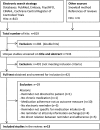The effectiveness of interventions using electronic reminders to improve adherence to chronic medication: a systematic review of the literature
- PMID: 22534082
- PMCID: PMC3422829
- DOI: 10.1136/amiajnl-2011-000748
The effectiveness of interventions using electronic reminders to improve adherence to chronic medication: a systematic review of the literature
Abstract
Background: Many patients experience difficulties in adhering to long-term treatment. Although patients' reasons for not being adherent are diverse, one of the most commonly reported barriers is forgetfulness. Reminding patients to take their medication may provide a solution. Electronic reminders (automatically sent reminders without personal contact between the healthcare provider and patient) are now increasingly being used in the effort to improve adherence.
Objective: To examine the effectiveness of interventions using electronic reminders in improving patients' adherence to chronic medication.
Methods: A comprehensive literature search was conducted in PubMed, Embase, PsycINFO, CINAHL and Cochrane Central Register of Controlled Trials. Electronic searches were supplemented by manual searching of reference lists and reviews. Two reviewers independently screened all citations. Full text was obtained from selected citations and screened for final inclusion. The methodological quality of studies was assessed.
Results: Thirteen studies met the inclusion criteria. Four studies evaluated short message service (SMS) reminders, seven audiovisual reminders from electronic reminder devices (ERD), and two pager messages. Best evidence synthesis revealed evidence for the effectiveness of electronic reminders, provided by eight (four high, four low quality) studies showing significant effects on patients' adherence, seven of which measured short-term effects (follow-up period <6 months). Improved adherence was found in all but one study using SMS reminders, four studies using ERD and one pager intervention. In addition, one high quality study using an ERD found subgroup effects.
Conclusion: This review provides evidence for the short-term effectiveness of electronic reminders, especially SMS reminders. However, long-term effects remain unclear.
Conflict of interest statement
References
-
- Sabaté E. Adherence to Long-term Therapies. Evidence for Action. Geneva: World Health Organization, 2003
-
- DiMatteo MR. Variations in patients' adherence to medical recommendations: a quantitative review of 50 years of research. Med Care 2004;42:200–9 - PubMed
-
- Sokol MC, McGuigan KA, Verbrugge RR, et al. Impact of medication adherence on hospitalization risk and healthcare cost. Med Care 2005;43:521–30 - PubMed
-
- Roebuck MC, Liberman JN, Gemmill-Toyama M, et al. Medication adherence leads to lower health care use and costs despite increased drug spending. Health Aff (Millwood) 2011;30:91–9 - PubMed
Publication types
MeSH terms
LinkOut - more resources
Full Text Sources
Medical
Miscellaneous


